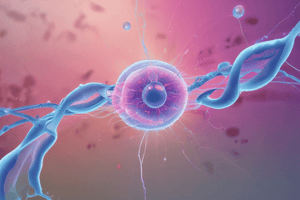Podcast
Questions and Answers
What is the primary reason ICSI is used during IVF?
What is the primary reason ICSI is used during IVF?
- To improve the overall IVF process
- To increase the chances of producing a healthy embryo
- To address male infertility issues related to sperm quality or quantity (correct)
- To facilitate the freezing and storage of embryos
What is the purpose of reverse sorted semen during IVF?
What is the purpose of reverse sorted semen during IVF?
- To select only the sperm cells with the desired genetic material (correct)
- To increase the chances of fertilization
- To improve the overall quality of the embryos
- To reduce the risk of genetic disorders in offspring
What is the average pregnancy rate of fresh IVF embryos?
What is the average pregnancy rate of fresh IVF embryos?
- 55% (correct)
- 40%
- 60%
- 50%
What is the average number of oocytes collected from a donor per aspiration?
What is the average number of oocytes collected from a donor per aspiration?
What is the purpose of the embryo culture step in the IVF process?
What is the purpose of the embryo culture step in the IVF process?
What affects the development rate of embryos during IVF?
What affects the development rate of embryos during IVF?
What is the primary purpose of artificial insemination?
What is the primary purpose of artificial insemination?
What is the process of collecting oocytes called?
What is the process of collecting oocytes called?
At what stage of development are embryos typically transferred to recipients?
At what stage of development are embryos typically transferred to recipients?
What is the main difference between artificial insemination and IVF?
What is the main difference between artificial insemination and IVF?
What is the purpose of maturing oocytes in a Petri dish?
What is the purpose of maturing oocytes in a Petri dish?
What type of semen may be used for fertilization in IVF?
What type of semen may be used for fertilization in IVF?
Study Notes
In Vitro Fertilization (IVF)
- IVF is a technology used for enhancing food animal productivity, conserving endangered mammals, and understanding fertilization and early development mechanisms.
- IVF involves fertilizing mature oocytes with sperm outside the uterus, i.e., in a dish.
Oocyte Collection and Maturation
- Oocytes are collected by ultrasound-guided follicular aspiration.
- Collected oocytes are matured in a Petri dish and fertilized 20-24 hours later.
Fertilization and Embryo Development
- Conventional, sexed frozen, or reverse-sorted semen may be used for fertilization.
- After fertilization, the oocytes develop for seven days in an incubator.
- Viable embryos that arise from this process are transferred to recipients or frozen for future use.
Artificial Insemination (AI) vs. IVF
- AI involves deliberate introduction of sperm into a female's cervix or uterine cavity for in vivo fertilization.
- The main difference between AI and IVF is that in AI, fertilization takes place inside the woman's body, whereas in IVF, eggs are harvested and fertilized in a lab.
Intracytoplasmic Sperm Injection (ICSI)
- ICSI is a technique used during IVF and involves injecting a single sperm directly into a mature egg using a glass needle to facilitate fertilization.
- ICSI is helpful when there are male infertility issues, such as sperm quality or quantity issues.
Frozen Embryo Transfer (FET)
- FET involves transferring embryos created through IVF that were previously frozen and stored for future use.
- These embryos can be thawed and transferred into a uterus at a later time.
Methods of Embryo Preservation
- Reverse-sorted semen is a technique used in cases where there may be a risk of passing on genetic disorders or diseases to offspring.
- This technique increases the chances of producing a healthy embryo by selecting only sperm cells with desired genetic material.
IVF Process
- The IVF process involves:
- Ovarian stimulation
- Egg retrieval
- Sperm collection
- Insemination through ICSI or traditional insemination
- Embryo culture
- Embryo transfer
- Pregnancy monitoring
- Birth
IVF Results
- On average, 30% of collected oocytes develop into viable embryos (Grade 1, 2, or 3).
- 18-22 oocytes are collected per aspiration, resulting in approximately 5-6 transferable embryos per IVF cycle.
- Embryo development rate varies depending on the sire used and semen type.
- Fresh IVF embryos achieve about a 55% pregnancy rate.
Studying That Suits You
Use AI to generate personalized quizzes and flashcards to suit your learning preferences.
Description
Learn about the basics of In Vitro Fertilization (IVF), a technology used to enhance food animal productivity, conserve endangered mammals, and understand fertilization mechanisms. Discover how oocytes are collected and matured in a Petri dish for fertilization. Test your knowledge of IVF principles and applications.




